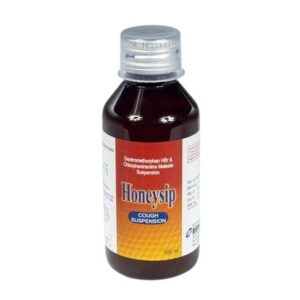DEXTROMETHORPHAN + MENTHOL
Dextromethorphan: Dextromethorphan is a commonly used over-the-counter cough suppressant medication. It is also available in prescription-strength formulations for more severe coughs.
Use: Dextromethorphan is primarily used to relieve cough symptoms caused by the common cold, flu, or other respiratory conditions. It is effective at reducing the intensity and frequency of coughing by directly acting on the cough center in the brain.
Mechanism of action: Dextromethorphan works by binding to and activating sigma-1 receptors in the brain, which leads to inhibition of the cough reflex. It also acts on NMDA receptors, which are involved in the transmission of pain signals, resulting in a mild analgesic effect. The exact mechanism of action is not completely understood.
Dose: The recommended dose of dextromethorphan varies depending on the formulation and the severity of the cough. For adults, the typical dose is 10-20 mg every 4-8 hours, not exceeding 120 mg in a 24-hour period. It is available in different forms such as tablets, capsules, and syrups. It is important to carefully follow the dosing instructions provided by the manufacturer or your healthcare provider.
Side effects: Common side effects of dextromethorphan include dizziness, drowsiness, nausea, and gastrointestinal upset. It is important to avoid driving or engaging in activities that require alertness until you know how this medication affects you. In high doses, dextromethorphan can cause hallucinations, confusion, and impaired coordination. This can be dangerous, especially in children or individuals with certain medical conditions. It is also essential to avoid combining dextromethorphan with certain medications, such as MAO inhibitors or alcohol, as it can lead to serious adverse effects.
While dextromethorphan is generally considered safe when used appropriately, it is advisable to consult with a healthcare professional before starting this medication, especially if you have any underlying medical conditions or are currently taking other medications.
Menthol: Drug: Menthol
Use:
Menthol is commonly used as a topical analgesic and cooling agent. It is widely used in various over-the-counter products such as creams, ointments, lotions, and inhalers. Menthol is utilized to relieve minor muscle and joint pain, reduce itching and irritation, and to provide temporary relief from nasal congestion.
Mechanism of Action:
Menthol works by activating the cold-sensitive receptors in the skin and mucous membranes. This activation creates a sensation of cooling and numbing, which helps to relieve pain and itching. In the case of nasal congestion, menthol binds to the receptors in the nasal mucosa, causing a cooling sensation and promoting a feeling of improved airflow.
Dose:
The dose of menthol varies depending on the formulation and the specific product being used. It is available in different strengths and concentrations. It is crucial to follow the instructions provided on the product label or as directed by a healthcare professional. Generally, menthol should be applied topically to the affected area in a thin layer and gently massaged until absorbed. Inhalers containing menthol should be used as directed.
Side Effects:
Menthol is generally considered safe when used topically or inhaled as directed. However, some individuals may experience mild side effects, including skin irritation, redness, or a burning sensation at the application site. If these side effects persist or worsen, it is advisable to discontinue use and consult a healthcare professional. In rare cases, individuals may exhibit signs of an allergic reaction, such as rash, itching, swelling, dizziness, or difficulty breathing. If any severe allergic reactions occur, immediate medical attention should be sought.
Note:
While menthol is generally safe for most people, it is important to consult with a healthcare professional before using menthol products, especially if you have any underlying medical conditions, are taking other medications, or are pregnant or breastfeeding.


